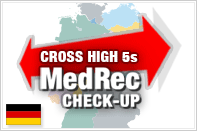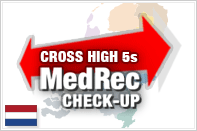Canada
Germany

Germany began preparation of implementing WHO's High 5s SOP for MedRec in 2011 and currently has 7 MedRec hospitals. One hospital implemented the SOP in the spring of 2012, while 3 further hospitals started in April 2013. The remaining 3 academic medical centers will begin with implementation later.
The Netherlands

The Government of the Netherlands developed a National Patient Safety Program to support hospitals in obtaining a certified system by December 2012. Hospitals are required to implement 10 themed improvement themes to reduce preventable harm and reach the theme goals. Prevention of medication errors for elective patients and at discharge was one of the ten themes. The WHO's High 5s SOP for MedRec supports the implementation of the national guideline for Medication Accuracy at transitions in Care for the most complex group of patients: patients 65 years and older admitted through Emergency Department. As a result, the Netherlands began the preparation of implementing the SOP for MedRec in 2010 with 11 hospitals and there are currently 15 hospitals in the process of implementing the SOP for MedRec within the country.
France

France started implementing the WHO's High 5s SOP for MedRec in 2010 and currently has 8 hospitals in the process of implementing MedRec. France had one hospital that pre tested the medication reconciliation practice from February to October 2010. Afterward the other hospitals that joined the project had an extended test period until June 2011. Since July 2011 all enrolled hospitals have begun the implementation process for MedRec in services / care units selected using performance data forwarded to the Lead Technical Agency.
Australia

In Australia, the first national collaborative project on MedRec was the Safer Systems - Savings Lives project which ran from 2006 to 2007. The Safer System - Saving Lives project was based on the 100,000 Lives campaign, an Institute for Healthcare Improvement (IHI) intervention. The project was funded by the former Australian Council for Safety and Quality in Health Care. Australia started implementing the WHO High 5s SOP for MedRec in 2010 and currently has 21 High 5s hospitals implementing the MedRec SOP. State led MedRec initiatives commenced in 2006 and many hospitals outside of those in the High 5s project have MedRec processes in place for some or all patients. Processes are generally pharmacy driven.
Switzerland

The WHO Action on Patient Safety - High 5s: The High 5s project was launched by the World Health Organization (WHO) in 2006 to address continuing major concerns about patient safety around the world.The High 5s name derives from the Project's original intent to significantly reduce the frequency of 5 challenging patient safety problems in 5 countries over 5 years.
The Mission of the High 5s project is to facilitate implementation and evaluation of standardized patient safety solutions within a global learning community to achieve measurable, significant and sustainable reductions in challenging patient safety problems.
The High 5s Project is a patient safety collaboration among a group of countries and the WHO Collaborating Centre for Patient Safety in support of the WHO World Alliance for Patient Safety.
United States

The United States started implementing the WHO's High 5s SOP for MedRec in Late 2012 and currently has 3 hospitals in the process of implementing the SOP. Medication Reconciliation has been a standard of practice for almost every hospital in the U. S. since 2003, however the procedural aspects in terms of when, who, and how it is conducted and documented varies. Limitations of the process are due to the variety and stages of implementation of a hospital's charting system or electronic health record. Because sites throughout the U.S. have been required by The Joint Commission National Patient Safety Goals to have a process for conducting Medication Reconciliation since 2004, enrollment in the WHO's high 5s SOP has been slow. Formalizing a process and studying it's effects is resource intensive which has been the primary reason for poor participation.
